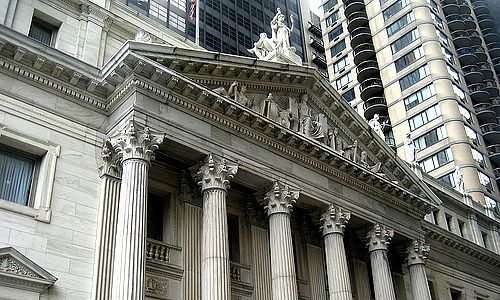An investment firm that claims it was cheated by UBS to the tune of hundreds of millions of dollars linked to an investment deal in China has sued the Swiss bank for fraud in the United States. The case is a bad omen for other Swiss banks.
UBS can claim to be Asia’s leading wealth manager. But this dominant role in the emerging continent could end up costing the Swiss banking giant dearly.
Financial investor Ace Decade Holdings has filed a complaint against UBS in New York Supreme Court (pictured) in connection with a controversial investment deal in China. According to the legal news site Law 360 (paywall), Ace Decade is blaming the Swiss bank for the $500 million loss it sustained.
The case shows that the Chinese stock market crash earlier this year could cause severe headaches for Swiss asset managers.
UBS declined to comment on the fraud accusations when contact by finews.ch.
Investment on credit
In 2014 when the business between the US investor and the Swiss bank was initiated, everything appeared to be in good order. According to the complaint filed to the US court, UBS advised its client Ace Decade to invest in shares of a Chinese company through Haixia Huifu Asset Investment and Fund Management.
The stakes were high. UBS allegedly advised Ace Decade to invest 500 million dollars in the fund managed by Haixia Huifu.
Rude awakening
Ace Decade did not need to put up much of its own money, UBS said. According to Ace Decade’s version of events, UBS offered credit of 775 million dollars – at a cost of 40 million dollars in interest and fees. The terms of the loan also included – and this turned out to be crucial – a margin call provision favorable to UBS, according to the complaint.
Ace Decade agreed to the terms and considered itself well on the way to a lucrative deal – until last July when the rude awakening came. Amid Chinese stock market turbulence, the price of the shares fell, triggering the margin call by UBS. Ace Decade was “caught off guard”, according to the complaint and left with 24 hours to make a prepayment of 200 million dollars to the bank.
Emergency sale
When the shocked mangers from Ace Decade asked UBS for more time, they were allegedly told that the bank had already begun selling off Ace Decade’s shares – some of which UBS allegedly sold to itself at a 20 percent discount.
Ace Decade alleges that it wasn’t party to the financing letter executed between UBS and Haixia Huifu. The US firm also says UBS advised against Ace Decade having management and voting rights over the shares.
Total loss
With the “emergency sale”, UBS allegedly made much more than it could have through margin calls – while Ace Decade had to write off 495 million of the 500 million it invested. A total loss.
Ace Decade is now seeking damages to cover its loss. It is suing the Swiss bank for fraud and unjust enrichment, amongst other charges, and claims it was not informed that Haixia Huifu was controlled by a UBS joint venture partner. The case is now in the hands of New York judges and can be added to the long list of legal cases pending against the Swiss bank.
No such thing as safe distance
Meanwhile it is becoming evident that turmoil in the Chinese stock markets – despite the great distance – could also affect other internationally-active Swiss banks.
This even more so, for example, in the business of Lombard credits to the wealthy of Asia which have been soaring in recent months, bringing stock market performance and credit demands into close quarters.
Ace Decade may not turn out to be a one-off case.
























